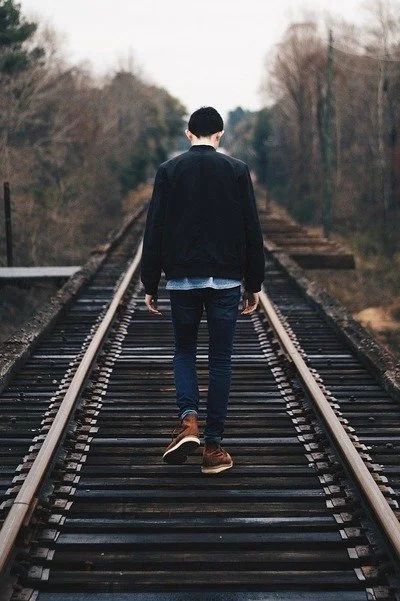Connecting Through Mental Illness ~ Part One
~ Part One
Photo by Annie Spratt on Unsplash
We Are Not Our Mental Illness. These words serve as a reminder that mental illness is a condition, not the totality of who someone is.
We recognize September as National Suicide Prevention Month in the US. In honor of those who struggle with this in their lives, the impact it has on their families, and those who give their time in guiding others in the direction of awareness and hope, I dedicate this two-part story about my son's journey through mental illness and as a reminder that:
"When you start a conversation with a loved one who may be struggling with thoughts of suicide, and when you offer support & model self-care, you are providing hope to those who may need it the most." (from SAMHSA 'There is Hope' #SPM24)
💖 💖 💖 💖 💖 💖
I was married in February 1979 to a man with two-year-old twin boys from his first marriage, Bobby and his brother. Because of circumstances, the twins didn't see or speak with their biological mother until they were teenagers. Over the next five years, we had two more boys together.
After a strenuous 15-year marriage, we divorced. The twins, now in high school, went to live with their father a few miles away, while the younger boys stayed with me. I had minimal contact with the twins at their father's insistence. Still, word around town was that they had begun running with the rougher crowd, dabbling in drugs and alcohol.
Bobby, in particular, began to unravel. Even after the drugs wore off, his reactions lingered. When he was younger, he'd struggled with sweaty palms, anxiety, and a need for everything to be just right—his hair, his clothes, his surroundings. It wasn't vanity. It was his way of staying grounded. And when things weren't in order, his anxiety would overtake him.
At the time, we didn't see it for what it was. We chalked it up to adolescence.
But by Bobby's late teens, his anxiety and paranoia had grown unmanageable. A complete neurological exam confirmed what we feared: Bobby was diagnosed with schizophrenia. The doctors believed his drug use accelerated the onset of the disease. He was just 18. The next four years were difficult and heartbreaking.
Like many with schizophrenia, Bobby couldn't tolerate enclosed spaces. The streets became his refuge. I'd be driving around town and spot him barefoot, arms stretched wide, talking to no one. The moment I saw him; a flood of emotions would hit me all at once:
I have to stop.
I can't stop—what if he reacts badly?
But he's my son, and he needs me. I must.
And then I'd rush home, make it through the front door, and collapse—sobbing, sick to my stomach, curling into myself on the floor and whispering, "Bobby, honey… I'm so sorry."
One afternoon, I came home from work and glanced through the window next to the front door. The two younger boys—then 10 and 14—sat frozen on the couch. There was no TV, no music, just silence and wide, fearful eyes.
I walked inside slowly. "What's going on, boys?"
Before they could answer, Bobby turned around from the far side of the couch and smiled.
"Hi, Mom! I was talking with the boys."
Without missing a beat, I replied, "Hey, sweetie." Then, gently, to the younger boys, "I'm sure you two have homework to do." They didn't need to hear this twice.
Bobby followed me into the kitchen.
"Hon, you know the rules," I reminded him. "You're always welcome here—but only when I'm home."
He nodded. "I guess I forgot. Hey, Mom… I wanted to talk to you."
"Okay, let's talk." As I pulled a chair out for him at the kitchen table, we sat down.
I don't remember much of the conversation—just that he told me he'd ridden his bike ten miles to see me and asked if I could give him a ride home.
His father had warned me, "Be careful. He can switch in an instant and could harm you."
But that wasn't my fear. Any physical pain Bobby could cause me would never compare to the pain my heart carried for him every day. If he lashed out, I would handle it. The mother in me felt no fear.
I packed his bike in the trunk and drove Bobby to the apartment he shared with a friend. He did most of the talking. He said he would try out for baseball soon and make it big. For a moment, his voice was light, and his humor flickered back, and he seemed like his old self. It made me smile. It made me ache.
We hugged goodbye and he walked away, pushing the bike toward the stairs of his home.
A few days later, he was arrested for preaching the Bible on his apartment balcony at 2:00 a.m. He was then placed in a rehab center, twenty miles from home, under lockdown. This pattern became Bobby's "new normal." In and out of the facility. Back and forth between moments of clarity and episodes that left him unreachable.
Six months later, he was back in rehab, and I knew I needed to see him. He had been in this overcrowded facility before, released each time after good behavior and promises to take his meds.
But Bobby rarely took them. They made him sluggish, heavy, and disconnected. Even in the facility, he'd hide the pills under his tongue and slip them into his pocket when no one was looking. When he was unsupervised and became increasingly irrational, they would lock him in his room.
Visitors had to pass through three thick metal doors, each echoing as it slammed shut behind them, and we weren't allowed to bring anything in.
When I arrived, Bobby was sleeping. I wasn't allowed in the room—it wasn't safe. But I could look through the rectangular window on the door. A kind guard told me to stay as long as I wanted and to let him know if Bob woke up.
His room was sparse—one thin mattress. A pair of tattered shoes on the floor—no laces, in case he got creative and tried to harm himself. His Bible rested beside him, worn and faded. It was his anchor. He used its words to preach warnings about Hell and salvation.
There he was, my son. Peaceful for the moment.
His long, unwashed hair glistened under the fluorescent lights—his clothes, simple and stained, hung loosely from his thin frame. Bobby's feet were the color of sand, as if he'd been trekking through the desert for days.
My eyes moved to his face. How many times had I washed that face and kissed those cheeks?
When he was little, he'd tell me, "Mom, I'm going to be a basketball star when I grow up!"
We used to joke that he'd probably grow up to be a bank president. Even as a kid, Bobby had a natural charm—smooth, sharp, and magnetic. And funny? Oh my, he could make you laugh till your sides hurt.
Once, I walked into the kitchen and saw him doing dishes with wads of tissue stuffed up his nose. "Bob? Really?"
He grinned. "Mom, this is the best way to stop a runny nose. And it works!" Then he did a little dance around the trash can. I laughed.
I thought, how you'd make me laugh, Honey. He was ridiculous. And precious.
As my focus returned to the window, looking through to my son's withering body, my eyes filled with painful tears of what was, and what is now. My heart fainted, and I left without seeing him awake.
A few months later, Bobby was back in rehab. This time, he was more volatile. The angry voices had grown louder within him, and he became obsessed with the book of Revelation and fixated on saving people from Hell. He believed it was his divine purpose.
The facility was losing patience. He had exhausted every limit. Then he began talking about ending his life.
I was going to him.
His father urged me not to.
But I did.
Because I was his mother.
Because I loved him.
Because nothing else mattered.
To be continued…
Courtesy of StockSnap / Pixabay.com
Thought to ponder:
Has there been a time when your gut told you to take one path, while others advised against it?
Thank you for stopping by, and if you find that someone would benefit from this story, please pass it along. I welcome your thoughts about this post.🦋
© Terry Pottinger 2025

